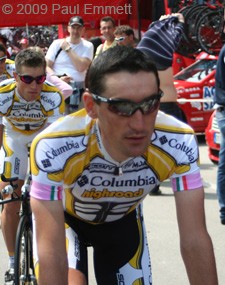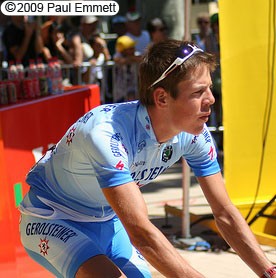Italian rider widely regarded as clean
 HTC Columbia rider Marco Pinotti has, unsurprisingly, reacted strongly to an assertion made by Italian anti-doping prosecutor Ettore Torri that all riders take banned substances.
HTC Columbia rider Marco Pinotti has, unsurprisingly, reacted strongly to an assertion made by Italian anti-doping prosecutor Ettore Torri that all riders take banned substances.
78 year old Torri, who heads the section of Italian Olympic Committee CONI in charge of stamping out doping, made the stunning claim in an Associated Press interview yesterday.
“I’m not the only one saying it. Lately, all of the cyclists I’ve interrogated have said that everyone dopes,” he told The Associated Press on Tuesday.
“The longer I’m involved in this, the more I marvel at how widespread doping is,” Torri said. “And I don’t think it will be eradicated. Because it just evolves continuously. There are new substances coming out that can’t be tested for.”
While Torri is normally regarded as someone who works diligently in this field, his blanket accusation will – justifiably – lead to anger. Although many accept that cycling and other sports have a doping problem, accusing every professional rider in the peloton is unprecedented and, almost certainly, very inaccurate.
Pinotti is one of several riders who has been outspoken against doping, and who is regarded as a clean rider who works hard and fairly.
“If you interrogate rider connected with doping, what did you expect them to say?” the Bike Pure supporter asked on his Twitter feed. “They prefer to hide behind the belief “everyone is doping” instead admitting they are losers, wanckers (sic), cheaters, liars.”
Pinotti’s anger is directed towards the riders making the claim, but it would be understandable if he was also irked by Torri’s assertion itself as it tars all riders with the same brush. It is also unprecedented as it essentially states that every rider who takes out a professional licence resorts to cheating.
Kohl raises questions:
Banned Austrian rider Bernhard Kohl is another who made a sweeping statement this week, telling the website FanHouse that he believed it was necessary to dope to win cycling’s biggest event. “People know in cycling that’s it’s not possible to win the Tour de France without it,” he said at the conclusion of the U.S. Anti-Doping Agency’s annual science symposium on Monday. “It’s three weeks, 3,000 km and you climb (the equivalent of) Mount Everest four times. That’s just not possible.”
 Kohl said he didn’t want to make a firm judgement on whether or not Alberto Contador took banned substances, but inferred it must be the case.
Kohl said he didn’t want to make a firm judgement on whether or not Alberto Contador took banned substances, but inferred it must be the case.
“Floyd Landis won the Tour de France and his average speed was 40 km/h,” Kohl said. “This year it was Cantador and it was also about 40. It was nearly the same average speed. Landis was doped. Maybe in 10 or 15 years, you can win (without drugs) if we work with the anti-doping movement.”
His statement led to criticism from many within the sport, with some such as Garmin-Transition’s CEO Jonathan Vaughters saying that Kohl’s decision to dope his way to third overall in the 2008 Tour de France doesn’t mean that everyone must resort to such methods. Vaughters said that Kohl could not finish in the top ten of the Tour de France without doping.
Vaughters’ rider Christian Vande Velde finished fourth overall in that Tour, moving up one place when the Austrian tested positive. He and the team are widely perceived to be clean, undergoing regular independent testing to show that they are not resorting to banned substances.
However Kohl’s assertion should be regarded in the context that most of the recent Tour winners have been either investigated or, in the case of Jan Ullrich, Marco Pantani and Floyd Landis, have undergone suspension or sanction. It is not nearly as provocative as that made by Torri.
The claim that every rider in the peloton breaks the sporting rules is, frankly, a very unfair one and there are likely to be many more riders than Pinotti who were annoyed to hear those statements yesterday.